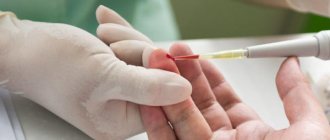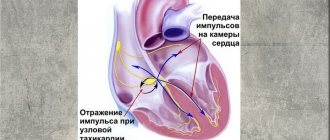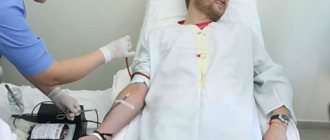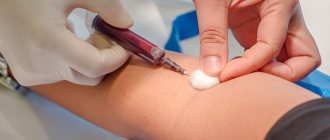The substrate for testing for syphilis can be blood, cerebrospinal fluid, or scrapings from skin rashes. In this article we will look at where blood is taken for syphilis, how to prepare for the test and how it is carried out.
The collection of biological material for the possible detection of antibodies active against treponema pallidum is carried out exclusively from the venous vessel of the ulnar vein, then the test tube with the test material is transferred to a biochemical laboratory for serological testing and detection of the bacterial causative agent of syphilis or its characteristic antibodies
Blood test for syphilis
The basis of modern human examination for syphilis (in addition to questioning and examination) is laboratory diagnosis. At the same time, the most reliable tests today are blood tests for syphilis. These tests are based on the detection of specific and nonspecific antibodies of the IgG and IgM classes in human blood. In the first case (specific antibodies), the test detects antibodies to the causative agent of syphilis, Treponema pallidum, which is why the analysis is called the “treponemal test.”
In the second case (nonspecific antibodies), antibodies are detected to the material released from cells destroyed by treponema. This test for syphilis has several names - it is known as a nonspecific antiphospholipid test, non-treponemal anticardiolipin test, RPR test or reagin test and is a modern analogue of the well-known Wasserman test (RW). Both blood tests for syphilis are used both for primary diagnosis and for monitoring the dynamics of treatment of this infection.
An important difference between treponemal and nontreponemal tests is the test result in a treated (recovered) patient. Some time after recovery, the non-treponemal test will show a negative result, but the result of the treponemal test will remain positive forever (even after recovery).
In addition to these two types of tests, there are several more blood tests for syphilis (polymerase chain reaction or PCR analysis, Wasserman reaction, immunofluorescence reaction or RIF, passive agglutination reaction or RPGA, Treponema pallidum immobilization reaction or RIBT, immunoblotting). These tests are also widely used to diagnose and monitor the disease.
How to get tested for Rw for pregnant women?
Rw, like any other test, has its own period; for different organizations it ranges from 20 days to 3 months.
Therefore, pregnant women are prescribed RV testing at least three times:
- When registering for pregnancy;
- At the thirtieth week of pregnancy;
- During admission to the maternity ward.
For pregnant women who have had syphilis, you can plan to conceive a child no earlier than after 5 years. Moreover, Rw of pregnant women shows a false positive result of infection in 1.5 cases out of 100. A repeat diagnosis is ordered and the result is refuted.
But if there really is an infection, then the pregnant woman is prescribed treatment that is aimed at preventing intrauterine infection of the fetus, its birth with infection, or the death of the unborn child.
Donating blood for syphilis
Antibodies detected by the reagin and treponemal tests take time to appear in a person’s blood. Therefore, detection of these antibodies using laboratory analysis is possible no earlier than 3-5 weeks after infection with the pale spirochete. This period coincides with the 7-10th day after the appearance of the first specific symptom of syphilis - chancre (a syphilitic ulcer that forms at the site of penetration of the pathogen into the human body).
Knowing this feature, it becomes clear why taking a test for syphilis immediately after suspicious sexual contact is pointless. A result obtained before the 3rd week after a possible infection will simply be unreliable.
What is RW analysis?
RW analysis refers to mandatory tests that some people undergo once a year. This test checks whether a person has syphilis. This is a very dangerous disease, and it can be asymptomatic for a long time. A person can have syphilis without knowing it and infect other people.
Moreover, syphilis is transmitted not only through blood or sexual contact, but also through household contact, through personal hygiene items and bedding. The causative agent of the infection is the pale spirochete, which infects humans, and at the same time, the development of the infection occurs in stages.
Each stage of syphilis is determined by characteristic signs, and each is dangerous in its own way. Moreover, each stage of the development of the disease is more dangerous than the previous one.
- Stage one is the initial incubation period, lasting from 20 to 40 days.
- The second stage is already determined by the signs characteristic of the disease. Rashes appear on the body, most often this occurs between the fingers, and lumps may appear on the body. This period lasts up to two months.
- Stage three - tubercles (syphiloids) appear on the body. Its duration can last up to four years.
- The fourth and most dangerous period is that it can end in death if the patient is not treated. This stage is characterized by softening of the bones, drooping of the nose, and various other symptoms of severe infection.
The sooner a person’s disease is detected, the greater the chance that it will not progress to the next stage, and the greater the likelihood of a speedy cure.
Blood from a finger for syphilis
Since in the pad of the nail phalanx of the finger (the place from which blood is taken, for example, for a general clinical analysis or for testing for sugar) there are only small vessels - capillaries, it is quite difficult to obtain from the finger an amount of blood sufficient for most tests for syphilis. Therefore, blood from a finger for syphilis is taken mainly only for screening examinations. If you receive a positive result from a finger prick blood test, blood tests from a vein are required.
Diagnostic stages
In order to pass the test correctly, it is recommended to avoid drinking alcoholic beverages and junk food the day before the procedure. The patient's diet can affect the result due to opalescence of the blood serum. You should not smoke 60 minutes before the test. If the patient is taking an antibiotic, diagnosis is delayed for a week. During this period, it is recommended to abandon antibiotic therapy.
Venous blood is collected in the morning on an empty stomach or 6 hours after a meal. If it is not possible to take blood from a vein, cerebrospinal fluid is used. The manipulation is carried out with a 10 ml syringe. The material is delivered to the laboratory. The specialist adds cardiolipin from the bovine heart and a protein special for communication - complement - to the sample.
If the sample contains antibodies to cardiolipin, a complement fixation reaction occurs. The antigen with protein and antibody combine and precipitate. The appearance of sediment itself may indicate that the test result is positive. A venereologist deciphers the study.
Who needs to donate blood for syphilis
A large number of people have to donate blood for syphilis: healthy or practically healthy, both adults and (sometimes) children. In addition to examination after sexual contact with an unexamined partner (partner with unknown status for syphilis and other sexually transmitted infections), a blood test for syphilis is indicated:
- blood and organ donors;
- pregnant women and women planning pregnancy;
- before surgical operations;
- persons with symptoms suspicious of syphilis (ulcers on the genitals, discharge from the genital tract, skin rash, swollen lymph nodes, bone pain, etc.);
- children born from sick mothers - for the diagnosis of congenital syphilis;
- during a preventive (screening) examination of workers with an increased risk of infection with Treponema pallidum (for example, workers in medical institutions).
Wasserman reaction - how is the analysis carried out, and what will the result tell us?
One of the first methods for diagnosing syphilis was the Wasserman reaction. This test aims to detect antibodies to Treponema pallidum in the patient's serum. It allows you to establish not only the fact of infection, but also the approximate time and duration of the disease.
Wasserman reaction - what kind of analysis is it?
When patients are sent for an RW blood test, not everyone knows what kind of test it is, why and how it is carried out.
This diagnostic method is named after the German immunologist who first carried out this revision, August Wasserman. This directly explains the abbreviation used to denote analysis - RW.
The method is based on the hemolysis reaction, the intensity of which is used to evaluate the results.
The advantage of the analysis is the ease of its implementation, but the main disadvantage is low specificity, which explains frequent false-positive results.
This blood test for syphilis indicates the concentration of antibodies to the pathogen in the patient's blood sample. During the study, an antigen is introduced into the collected sample, which reacts with nonspecific antibodies present in the patient’s body. The severity of the lesion is determined by the intensity of the reaction.
Depending on whether it is positive or doubtful, possible timing of infection is suggested. Thus, at 6-8 weeks of illness, the reaction is positive in 90% of patients, and with secondary syphilis - in 98-109% of cases. In addition, the Wasserman reaction can be used to assess the effectiveness of syphilis therapy.
When is a Wasserman reaction test needed?
A blood test for the Wasserman reaction is a mandatory test for expectant mothers and donors. All patients with suspected syphilis are referred for testing.
The analysis is included in the list of mandatory examinations for certain categories of workers:
- military personnel;
- health workers;
- civil servants;
- catering staff.
Other possible reasons for testing include:
- upcoming elective surgery;
- the presence of symptoms characteristic of syphilis (prolonged fever, enlarged lymph nodes);
- sperm donation;
- addiction;
- contact with a patient with syphilis.
Wasserman's reaction - how to pass?
Blood is taken from a vein for the Wasserman reaction. For the patient, this procedure is no different from conventional biochemistry. A sample of biomaterial is taken from the cubital vein and placed in a test tube, which is labeled and sent for testing to the laboratory. To obtain objective results and reduce the risk of false negatives, it is necessary to follow a number of rules and prepare for the study.
Wasserman reaction analysis - preparation
Like all tests, it is better to take a test for syphilis in the morning.
The main question that interests patients who have received a referral concerns how the Wasserman reaction should be carried out correctly: on an empty stomach or not? Doctors do not give strict instructions on this matter, but they recommend being examined on an empty stomach. It is advisable that at least 4 hours have passed since the last meal.
Other rules that must be followed in order to properly prepare for the analysis:
- Avoid drinking alcohol two days before the examination.
- Avoid fatty foods and fried foods 24 hours before the test.
- Stop taking digitalis medications after consulting with your doctor.
Carrying out the Wasserman reaction
The research is carried out in a laboratory setting. A special antigen is injected into a patient's blood sample.
Currently, cardiolipin is used, which is obtained from the heart of cattle.
Syphilis-nonspecific antibodies, when present in the sample, react with the lipid - the Wasserman reaction. Its intensity is used to evaluate the presence of antibodies in the serum and the degree of damage.
Patients are often interested in the question: how long does it take to complete the Wasserman reaction? The study itself lasts a few minutes, but in most cases the result is given out in 1-2 days. This is explained by the workload of the laboratory and individual clinic. In some institutions, when conducting research on a paid basis, the result can be obtained after 2 hours.
Today, rapid diagnosis of syphilis, which is used in combination with treponemal tests, is becoming widespread.
Patients who are examined for syphilis as part of a medical commission are often interested in the expiration date of the blood test for RW. It is worth noting that in these cases there are no uniform standards: some organizations accept certificates that were issued no later than 2 weeks ago, others – 2 months.
The type of examination also plays an important role: preliminary, in order to determine the fact of infection, or periodic – when the diagnosis is made and the results of treatment are periodically assessed. In such cases, the analysis can be prescribed once every 3 months. If the medical commission is passed, doctors consider the conclusion valid within two weeks.
RW blood test results
After an RW blood test has been performed, the results are deciphered by the doctor who sent you for examination.
The conclusion may indicate one of the following results:
- positively;
- negative.
Studying the RW blood test, what the written conclusion means is not clear to the average patient. A positive reaction can have 4 stages. Depending on its severity, the result indicates:
- “++++” – hemolysis is completely absent, the body has a large number of antibodies to fight the causative agent of syphilis;
- “+++” – positive reaction with a long delay in hemolysis;
- “++” – delay of hemolysis in a separate part of it;
- “+” is a questionable result and requires re-examination.
A negative reaction is indicated by the complete absence of hemolysis delay in the test sample. In this case, we can say that the patient is healthy. If a similar result is obtained after a course of treatment, after a certain time the study is repeated to exclude relapse of the disease.
Positive Wasserman reaction
A positive result in most cases indicates syphilis.
A similar phenomenon is observed in various forms of the disease:
- primary syphilis;
- secondary syphilis;
- tertiary seropositive syphilis.
According to experts, there are a number of other pathologies, the development of which will result in a positive result. In this regard, in order not to panic after receiving the test result, you need to know for which diseases the Wasserman reaction is positive.
Among the pathologies:
- tuberculosis;
- lupus;
- malaria;
- viral infections;
- leptospirosis;
- pemphigus;
- neoplasms of various localizations.
False-positive Wasserman reaction
Antibodies begin to be produced in the body after cardiolipin enters it. This antigen is not characteristic of the human body, but in some disorders and diseases its appearance becomes possible. As a result, in the absence of the causative agent of syphilis in the body of the person being examined, the result will still be positive (false-positive reaction).
As medical observations show, the false positive Wasserman reaction, the causes of this phenomenon are often associated with the following factors:
- past pneumonia;
- liver diseases;
- blood diseases;
- pregnancy period;
- violation of the laboratory research algorithm.
Wasserman's negative reaction
A negative result is indicated when hemolysis occurs completely, without delay.
When a rapid blood test for syphilis is performed, in this case, due to the absence of antibodies in the patient’s blood sample, binding to the antigen does not occur and the complex is not formed. Based on microscopy, a conclusion is drawn.
In addition, the timing of the test must be taken into account. In the first week of illness, the Wasserman reaction will be negative due to insufficient concentration of antibodies in the blood.
A false negative result can occur in patients with syphilis up to the 17th day after infection. As statistics show, even in the 5-6th week of illness, only 25% of patients will have reliable results. It is advisable to conduct the study no earlier than 6-7 weeks from the moment of suspected infection.
Due to the nonspecificity of the Wasserman reaction, the express method for diagnosing syphilis and the following laboratory tests are often used as an alternative:
Source: https://womanadvice.ru/reakciya-vassermana-kak-provodyat-analiz-io-chem-rasskazhet-rezultat
False positive test for syphilis
In some cases, the result of a blood test for syphilis may be incorrect, or rather false positive or false negative. The frequency with which the laboratory produces such results is low and does not exceed 5%.
The main reasons for false-positive blood tests for syphilis include:
- Diffuse connective tissue diseases (for example, rheumatoid arthritis, systemic lupus erythematosus);
- Diabetes;
- Recent vaccination of the patient;
- Some infectious diseases (for example, tuberculosis, infectious mononucleosis and viral hepatitis);
- Pregnancy;
- Inflammatory heart disease (for example, endocarditis);
- Alcoholism and drug addiction;
- Previously suffered and cured syphilis (for treponemal test).
False results
Laboratory testing of collected blood may result in a false positive result. This is possible if the patient previously had syphilis, but underwent complex therapy, took antibacterial drugs and was completely cured of treponema pallidum.
Most often, a false positive result is shown by the ELISA blood test method. In this case, the person is recommended to undergo a second blood donation, but using the Wasserman reaction and the use of cardiolipin as the main antigen.
False negative result
There are clinical cases of blood testing for syphilis when the ELISA method shows a negative result, and the Wasserman reaction reflects the presence of Treponema pallidum antibodies. Obtaining false negative data is possible if a person has concomitant infectious diseases such as viral hepatitis, HIV, chlamydia, gonorrhea.
If such results are available, the patient is scheduled for a repeat test. In case of repeated receipt of a false negative result, the conclusion based on the Wasserman reaction is taken as a basis.











